May 31, 2025 | 17:46 GMT +7
May 31, 2025 | 17:46 GMT +7
Hotline: 0913.378.918
May 31, 2025 | 17:46 GMT +7
Hotline: 0913.378.918

Photo: Peter Roek
Salmonella is a foodborne pathogen that disrupts the pig’s gut microbiota. It leads to diarrhea, enterocolitis, and dehydration. Healthy gut microbiota decrease the severity of Salmonella infection. Therefore, feed supplements that improve gut microbial populations help control Salmonella infections. Resistant starch is a source of microbiota accessible carbohydrates that increase short-chain fatty acids in the gut, thus improving gut barrier functions. Raw potato starch is a common ingredient of resistant starch that improves fermentation in the digestive tract and increases pro- and anti-inflammatory cytokine levels.
The team randomly divided 12 castrated male pigs (Landrace × Yorkshire) of 28 days of age into the treatment and control groups. The treatment group diet was supplemented with 5% raw potato starch for 21 days. Subsequently, the researchers orally inoculated all pigs with colony forming units of Salmonella Typhimurium. They euthanised them 14 days after bacterial inoculation.
The team collecte fecal and gut tissue samples from jejunum, ileum, colon, and cecum and they incubated these immediately at 42°C for 24 hours. They fixed and stained tissue samples for histopathological evaluation and cytokine quantification. Then, they extracted DNA, and performed bioinformatics analysis was. In addition, they evaluated the concentrations of short-chain fatty acids including acetate, butyrate, and propionate in all experimental pig fecal samples to investigate the effect of altered bacterial communities in both groups.
Although a Salmonella infections reduces body weight and average daily gain, pigs fed with the raw potato starch supplemented diet had a higher average daily gain and a lower Salmonella shedding during the Salmonella infection period. These findings show the gut health-promoting effect in pigs that received a raw potato starch supplemented diet.
Although the researchers observed histopathological lesions in both groups, pigs fed with raw potato starch exhibited less severe organismal damage in the jejunum, ileum, cecum, and colon.They also had a lower isolation rate of Salmonella from the gut tissue. In addition, feeding raw potato starch improved gut health by maintaining the balance of beneficial bacteria, and by increasing the abundance of butyrate-producing and acetate-producing bacteria. This prevented the colonisation of pathogenic bacteria by decreasing gut mucosal permeability.
High acetate and low butyrate/propionate concentrations could cause a more invasive Salmonella infection. In addition, the relative mRNA expression levels of genes related to gut barrier function including CLDN-1 in the cecum and MUC2 in the colon were significantly lower in the pigs fed with raw potato starch, suggesting lower gut permeability.
The relative mRNA expression of the proinflammatory cytokine IL-18, which is necessary to initiate mucosal inflammation was significantly lower in the jejunum and colon of the pigs fed with raw potato starch supplemented diet suggesting reduced Salmonella colonisation. On the other hand, among the genes related to the gut barrier, the expression of the antimicrobial peptide gene Reg3γ was significantly higher in the cecum but lower in the colon of the pigs fed with raw potato starch supplemented diet. The Reg3γ restricts bacterial colonisation of the gut mucosal surface and maintains spatial segregation between bacteria and gut epithelium.
However, the anti-inflammatory cytokine IL-10, and the proinflammatory cytokine IL-17A were expressed less in the jejunum, cecum, and colon of pigs fed with raw potato starch supplemented diet, because Reg3γ overexpression induced high immunosuppression and dramatic reduction in cytokine genes.
The authors concluded that feeding weaned pigs with raw potato starch could improve gut health and reduce Salmonella infections.
(PP)

(VAN) Vikas Rambal has quietly built a $5 billion business empire in manufacturing, property and solar, and catapulted onto the Rich List.

(VAN) Available cropland now at less than five percent, according to latest geospatial assessment from FAO and UNOSAT.

(VAN) Alt Carbon has raised $12 million in a seed round as it plans to scale its carbon dioxide removal work in the South Asian nation.

(VAN) Attempts to bring down the price of the Japanese staple have had little effect amid a cost-of-living crisis.

(VAN) Fourth most important food crop in peril as Latin America and Caribbean suffer from slow-onset climate disaster.

(VAN) Shifting market dynamics and the noise around new legislation has propelled Trouw Nutrition’s research around early life nutrition in poultry. Today, it continues to be a key area of research.

(VAN) India is concerned about its food security and the livelihoods of its farmers if more US food imports are allowed.